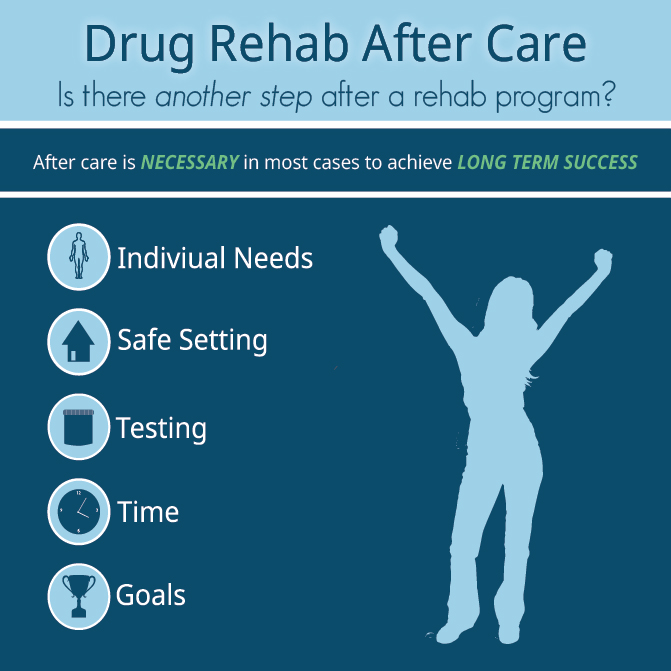
You have just completed a drug or alcohol rehab program for an addiction and find yourself wondering if there is another step. Do people that complete drug treatment just walk out the door clean and sober and stay that way or is there a required drug rehab aftercare method that guarantees sobriety?
According to the National Institute on Drug Abuse’s Treatment Approaches for Drug Addiction, only 2.4 million of the 23 million people addicted are even receiving treatment. In addition to this, most drug and alcohol rehabilitation programs report that averages of 50% of clients fully complete their treatment. Those that fully complete a drug or alcohol treatment program have the highest chances of staying clean and sober. However, drug rehab aftercare is necessary in most cases to achieve this.
The National Center for Biotechnology information from the United States Library of Medicine reports that aftercare is cited as a necessary component to treatment. This is especially necessary for those who have had run-ins with the criminal justice system to ensure both addiction and the crimes connected to it do not reoccur.
Types Of Aftercare For Drug Rehab
Intensive Outpatient Aftercare Services
 Several thousand outpatient facilities exist that provide aftercare or sober living. Many of these have culturally specific services and assessments as well as counseling, drug education and prevention lectures, counseling for domestic violence, and drug testing services. Often these outpatient programs will utilize the Alcoholics Anonymous (AA) or Narcotics Anonymous (NA) approaches to requiring patients to attend these meetings as a part of their outpatient aftercare. Some outpatient programs also provide set up services for clients such as employment referrals, medical referrals and help with housing needs. If a client is taking medications, some outpatient programs can administer these as well.
Several thousand outpatient facilities exist that provide aftercare or sober living. Many of these have culturally specific services and assessments as well as counseling, drug education and prevention lectures, counseling for domestic violence, and drug testing services. Often these outpatient programs will utilize the Alcoholics Anonymous (AA) or Narcotics Anonymous (NA) approaches to requiring patients to attend these meetings as a part of their outpatient aftercare. Some outpatient programs also provide set up services for clients such as employment referrals, medical referrals and help with housing needs. If a client is taking medications, some outpatient programs can administer these as well.
Remote Follow Up Services
Many holistic and long-term residential treatment programs use a successful form of remote follow up aftercare services. Clients complete their residential portion of their programs and meet with an aftercare specialist to program out their goals for each area of their life. During the process, potential problems are also assessed and solutions worked out for these. Family members and loved ones are also involved in the process as they act as the positive support system for the client. The individual leaves treatment with their aftercare plan and the specialist from the facility checks in with them weekly to make sure the program is being completed and the client is making positive strides toward recovery. If any problems occur, the client is assessed and solutions are found for more intensive aftercare, or if necessary, a return to inpatient treatment to handle further issues that have not been fully addressed.
Halfway House or Therapeutic Community Aftercare Methods
A halfway house or therapeutic community is a place that an individual can go after treatment where they are able to work, pay rent and live in a drug-free group. Most halfway houses have strict rules for clients, drug testing and are a transitional living situation. Programs are used with halfway houses or therapeutic communities to re-integrate the individual into society. These places are usually operated by faith or community groups. There are also some state-run halfway houses for probation and parole residents. Some skills taught through living in this type of community are keeping a clean living space, properly paying bills and fines and living in a drug-free group operating in a society with a job and without the use of drugs or alcohol. For those with children halfway houses or therapeutic communities exist that help with parenting skills in a supervised setting.
Inmate Programs
The National Criminal Justice Reference states that over 1 million arrests were for drug-related crimes. In addition to this, an average of 80% of individuals arrested tested positive for drugs. Many states have implemented treatment programs within the prison walls and require drug rehab aftercare as a term of parole or probation. This often requires former inmates to attend therapy a few hours a week and also volunteer in the community on betterment and service projects. Statistically, especially in the state of California, this has proven to be successful with inmates. Often inmates will have to do aftercare services for one year after their release.
Top Five Things An Aftercare Program Should Provide
There are several things that an aftercare program should provide in order for it to get successful results with clients. They are as follows:
- Aftercare should help a client set real goals and handle real-life problems – These goals and problems are usually what lead the individual down the road to addiction in the first place. Continual assessment of the current situation, including problems and barriers are key to maintaining sobriety. The weekly meeting should be done whether in person or remote to make sure that improvements are being made continually and any remaining issues should be reassessed as needed.
- Aftercare should utilize drug testing – Often drug testing can be seen as controversial or problematic but is a good disciplinary measure for those formerly addicted. Weekly, bi-weekly or random drug testing is a good preventative aftercare method that can deter the person from doing drugs. In the cases of a failed drug test, the use can be found early and further treatment plans can be created.
- Aftercare needs to be long enough to get a positive result – For the many who have struggled with addiction, aftercare is an integral part of the rehabilitation and recovery process.
- Aftercare should address the specific needs of the individual – When a person is addicted they have gone through certain environmental, emotional and physical factors that are specific to the problem. An aftercare program should continue to address these and any new issues that come up specifically geared toward the individual.
- Aftercare needs to be done in a safe setting – An aftercare program should be done in a setting that is comfortable for the client so they can truly communicate the problems they encounter after treatment. The client must feel safe with the aftercare specialist and feel that they are getting the help that they need from the post-rehab treatment.
A good aftercare program can help an individual to stay clean and sober on a permanent basis and lead them down the road to lifelong recovery. Contact DrugRehab.org today for more information on aftercare programs, and all other drug and alcohol rehabilitation related programs.
Additional Resources From DrugRehab.org:
- How Do I Get My Loved One Into Rehab?
- Heroin and Opioid Addiction Statistics
- What Is A Relapse Prevention Plan?
- Social Learning Theory Of Addiction Treatment
- How Much Does a Drug and/or Alcohol Intervention Cost?
Are you or a loved one suffering from addiction?
Don't wait, get the best treatment options today
Call Now: (833) 473-4227
